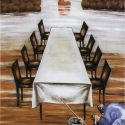Ditte Cederstrand grew up in the wealthy neighbourhood of Hellerup, trained in business at Niels Brock – Copenhagen Business College, and worked as a secretary and correspondent. After her marriage in 1937 to a German vicar, she lived in Germany during World War II, but fled to Denmark at the end of the war with her two children, with a third on the way.
After the war, through her partnership with the author Harald Herdal, she became part of a circle of socialist authors and made her debut in 1953-1955 with the trilogy Den hellige alliance, which is a bourgeois family and contemporary novel set in World War II. Livet det rige (N), 1960, and Over sukkenes bro (N), 1962, are historical romances set in eighteenth-century Sweden, which also portray the development of early capitalism. In the mid-1960s, she took her work to a factory in order to write Bagerbørn (N), 1967.
Her true breakthrough came in the 1970s with the publication of De uspurgtes historie, 1974-1982, a genealogical seven-volume novel which relates the story of the workers. Her other works include DDR, 1951, an enthusiastic travel account, the schoolbook Rhinen, 1962, Anne blir fri, (N), 1977, Årringe (N), 1977, Revolutionens ørn. 13 billeder af Rosa Luxemburgs liv (P), 1979, Første etape (M), 1984, and Seks dage (N), 1984.


